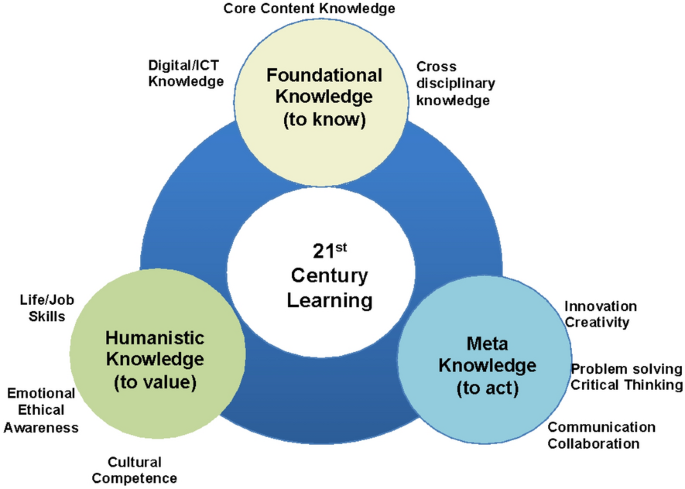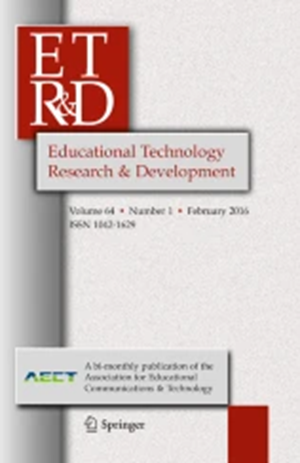Design principles to develop digital innovation skills: a design-based research approach
IF 4.2
3区 教育学
Q1 EDUCATION & EDUCATIONAL RESEARCH
Etr&d-Educational Technology Research and Development
Pub Date : 2023-11-10
DOI:10.1007/s11423-023-10308-y
引用次数: 0
Abstract
Abstract The digitisation of the world has led to a multitude of far-reaching implications that require students to be prepared for the dynamic era of rapid change, complexity, fluidity, and ubiquity in which they will work at the forefront of technology. To succeed in this environment, students must be able to design and implement digital innovations within the broader spectrum of digital transformation. Despite the importance of this area, the literature shows a lack of research on how digital business innovation skills can be effectively taught to students. To address this gap, a design-based research (DBR) study was conducted using a mixed-methods design through three iterations at a South African university. The study aimed to answer the research question of how digital business innovation skills should be taught to South African Information Systems students. The study commenced with an analysis of practical problems experienced by practitioners, industry, students, and researchers and an initial review of pertinent literature. The literature review focused on the impact of digitisation on future skills requirements to inform the pedagogy, content, and technology applicable to the teaching and learning environment. The findings yielded design principles for the design of the learning environment that were tested and refined via three iterations, resulting in nine design principles. The aim was to ensure a future-oriented, industry-informed curriculum design that is relevant to the digital economy.

开发数字创新技能的设计原则:基于设计的研究方法
世界的数字化已经带来了许多深远的影响,这要求学生们为快速变化、复杂、流动性和无处不在的动态时代做好准备,他们将在技术的最前沿工作。要在这种环境中取得成功,学生必须能够在更广泛的数字化转型范围内设计和实施数字创新。尽管这一领域很重要,但文献显示缺乏关于如何有效地向学生教授数字商业创新技能的研究。为了解决这一差距,一项基于设计的研究(DBR)研究在南非一所大学进行,使用混合方法设计,经过三次迭代。该研究旨在回答如何向南非信息系统专业的学生教授数字商业创新技能的研究问题。本研究首先分析了从业人员、工业界、学生和研究人员所遇到的实际问题,并对相关文献进行了初步回顾。文献综述侧重于数字化对未来技能要求的影响,以告知教学方法、内容和适用于教学和学习环境的技术。这些发现为学习环境的设计提供了设计原则,经过三次迭代的测试和完善,产生了九个设计原则。其目的是确保面向未来、行业知情的课程设计与数字经济相关。
本文章由计算机程序翻译,如有差异,请以英文原文为准。
求助全文
约1分钟内获得全文
求助全文
来源期刊

Etr&d-Educational Technology Research and Development
EDUCATION & EDUCATIONAL RESEARCH-
CiteScore
10.70
自引率
4.00%
发文量
94
期刊介绍:
Educational Technology Research and Development is the only scholarly journal in the field focusing entirely on research and development in educational technology.
The Research Section assigns highest priority in reviewing manuscripts to rigorous original quantitative, qualitative, or mixed methods studies on topics relating to applications of technology or instructional design in educational settings. Such contexts include K-12, higher education, and adult learning (e.g., in corporate training settings). Analytical papers that evaluate important research issues related to educational technology research and reviews of the literature on similar topics are also published. This section features well-documented articles on the practical aspects of research as well as applied theory in educational practice and provides a comprehensive source of current research information in instructional technology.
The Development Section publishes research on planning, implementation, evaluation and management of a variety of instructional technologies and learning environments. Empirically based formative evaluations and theoretically based instructional design research papers are welcome, as are papers that report outcomes of innovative approaches in applying technology to instructional development. Papers for the Development section may involve a variety of research methods and should focus on one aspect of the instructional development process or more; when relevant and possible, papers should discuss the implications of instructional design decisions and provide evidence linking outcomes to those decisions.
The Cultural and Regional Perspectives Section (formerly International Review) welcome s innovative research about how technologies are being used to enhance learning, instruction, and performance specific to a culture or region. Educational technology studies submitted to this section should be situated in cultural contexts that critically examine issues and ideologies prevalent in the culture or region or by individuals or groups in the culture or region. Theoretical perspectives can be broadly based and inclusive of research, such as critical race theory, cultural-historical activity theory, and cultural models. Papers published in this section include quantitative, qualitative, and mixed-methods articles and reviews drawing on relevant theories, empirical evidence, and critical analyses of the findings, implications, and conclusions within a cultural context.
Educational Technology Research and Development publishes special issues on timely topics of interest to the community, in addition to regular papers.
 求助内容:
求助内容: 应助结果提醒方式:
应助结果提醒方式:


